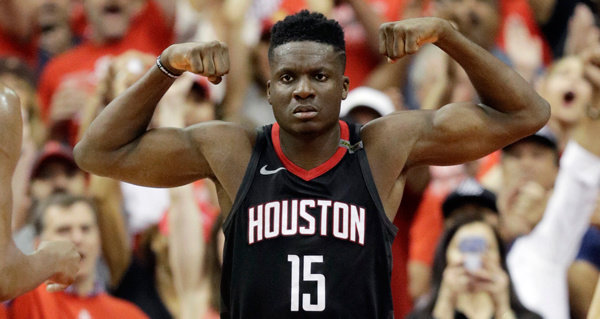It’s not Clint Capela’s fault that the Blazers signed Evan Turner to a four-year, $70 million contract two summers ago, or that the Heat are paying Tyler Johnson $19 million next season, or that Nic Batum has $76 million left on his deal. But he might have to pay for other people’s mistakes. Though this is no great tragedy—the Rockets are offering him four years and $85-90 million—it’s not exactly fair. Capela wants market value for his estimable talents. Unfortunately for him, this offseason’s market is uniquely shallow.
Laying out why all but a small handful of NBA franchises have a large amount of cap space at the moment, transaction by transaction, would be pretty tedious, so let’s explain it this way: the league collectively lost its mind two summers ago, when the cap spiked by $24 million and nearly every general manager’s sense of value got out of whack. Wait, what does Allen Crabbe cost now? became a genuinely vexing question that tripped smart people up. It was a frenzied, scienceless gold rush, except the gold was mostly rotation players and glue guys who were, in the moment, perhaps not getting massively overpaid but are now, we fully understand, cap-cloggers that restrict their teams’ flexibility in free agency. And that’s never been a more acutely felt problem, across the NBA, than it is right now. The strain will lessen a bit next summer, when some of those bloated contracts come off the books, and by 2020, the hangover will have completely dissipated.
Clint Capela’s problem, obviously, is that he’s a free agent at this very moment. It’s lousy luck, because he’s a very good player who’s had a remarkable rise. Two years ago, he was Dwight Howard’s understudy, known even by deeply involved NBA fans as a super-athletic, vaguely promising prospect whom the Rockets had whispered-about ideas of installing as Howard’s replacement sooner rather than later. When Howard left for Atlanta and Capela took over as starting center in 2016-17, he performed well in a limited, DeAndre Jordan-style role. Mike D’Antoni asked him to protect the rim, rebound, and convert easy buckets from inside five feet. Capela did all of that pretty capably—putting up 12.6 PPG and 8.1 RPG on 64.3 percent shooting—while also being an altogether more pleasant and low-maintenance teammate than Howard had been.
It was last season that Capela truly broke out. Though his numbers didn’t take off into the stratosphere—13.9 PPG, 10.8 RPG, 65.2 percent from the floor—he became the team’s third-most important player behind James Harden and Chris Paul. Throughout the 2017-18 season, the Rockets focused on developing a style that could beat the Warriors in a playoff series, and that meant rejiggering their defense to become as fluid and switchable as possible, which is usually hard on traditional big men, most of whom look exceedingly uncomfortable Clydesdaling around on the perimeter with some six-foot-three guard dancing in front of them. Capela took to his new responsibilities as well as anybody could have asked him to, demonstrating quick feet and solid instincts in reading whether smaller, shiftier players were driving at him to get by or trying to create space for a jumper. He handled this while still capably guarding the rim and punishing small-ball lineups with his rebounding. After two years of learning new tricks, Capela now does just about everything you would want a modern five to do except space the floor.
Which means he should be in high demand, but there aren’t many franchises kicking around who can pay him what he’s worth. Plus restricted free agency, with the way it ties up cap money for days at a time and gives the home team a chance to match salaries, persuades competitors from making bids on players unless they firmly believe they can poach them. Capela doesn’t have many options, in this depressed market. Beyond hoping that some miraculous proposition from, say, the Atlanta Hawks arrives, he can either take the Rockets’ slightly insulting deal or accept his one-year qualifying offer and pray he doesn’t land on his Achilles the wrong way at any point next season. It’s a less than optimal situation.
We talk often of how franchises hamstring themselves with bad contracts—if you hadn’t signed Player X for so much money two years ago, you could’ve gotten Player Y this summer and shored up your backcourt, etc.—but it’s less heavily discussed how front office profligacy, combined with a salary cap that artificially depresses wages and, in Capela’s case, a league-entry process that restricts early career player movement, can severely limit the options of players who become free agents at just the wrong time. Clint Capela’s going to be fine, wherever he’s playing basketball next year, for however much he’s pulling down, but he’s unlikely to be working for what he deserves. He’s done everything right and been ill-served by a system that’s at least a little bit broken.



